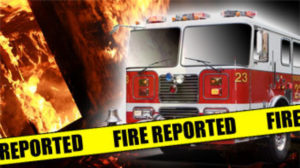
U.S. fire departments responded to an estimated 1,298,000 fires in 2014. These fires resulted in 3,275 fatalities, 15,775 injuries and an estimated $11.6 billion in direct property loss. Seventy percent of reported home fires and 84% of the home fire deaths occurred in one- or two-family homes, including manufactured homes. The remainder occurred in apartments or other multi-family housing. (Stats from NFPA)
Some fires are caused by issues related to the structure, such as lightning strikes, faulty wiring, furnace malfunctions, and other electrical and heating system-related mishaps. But most home and apartment fires are preventable.
Fairfield Home Inventory would like to pass along the following tips and suggestions to ensure the safety of homeowners, condo owners, renters and their families.
Smoke/Carbon Monoxide Detectors
- Smoke Alarms save lives, install at least one smoke/carbon monoxide detector on each level of your home, including near sleeping areas.
- Daylight savings time is coming to an end on November 1st. When you reset your clocks (fall back) remember to change the batteries in your smoke and carbon monoxide detectors.
Furnaces & Fireplaces/Wood Stoves
- Have a qualified technician (contract with oil/gas company) to inspect and clean your furnace once a year.
- Make sure emergency shut off and automatic controls are in good working condition
- Keep oily rags, trash, newspapers, paint, spray cans, etc. away from the furnace area.
- If you have a fireplace or wood burning stove have your chimneys/flu and vents checked by a reputable, certified Chimney Sweep/technician. Fireplaces produce creosote which can ignite. If you light fires frequently, you need a chimney sweep service at least once a year. When you burn wood, make sure it’s dry and seasoned (not green) so that it produces more flame and less smoke, reducing creosote build-up.
- Never leave a fire unattended – make sure the fire is out before going to bed.
- Place ashes outside in a covered metal container at least five feet away from the house or anything that can burn.
- Cover your fireplace or woodstove opening with a screen protector to eliminate sparks from jumping out into living area.
- Never close the damper to your fireplace while there are hot ashes present. Closing the damper could make the fire flare up and this will cause carbon monoxide to be released into the house.
Cooking & Kitchen Safety
Kitchens are a favorite gathering place in many families especially during the holidays. Cooking fires are the most common type of fires in U.S. households. By paying attention while cooking, you can prevent a kitchen fire.
- If you are frying, grilling, or broiling food, stay in the kitchen. Turn off the stove if you have to leave the kitchen, even if only for a short time. If you are simmering, baking, roasting, or boiling food, you don’t have to stay in the kitchen, but you do need to stay in the home. Check the food regularly and use a timer to remind you that there is something cooking.
- Keep flammable objects—pot holders, oven mitts, wooden utensils, and paper or plastic bags—away from the stovetop. Wear close-fitting clothing that won’t drape over or touch burners while cooking.
- Although turkey fryers may produce delicious holiday dinners, they pose significant fire hazards. For safe turkey fryer use tips, visit the US Fire Administration’s page on cooking safety.
- Know how to put out a grease fire; water will make it spread but salt or baking soda will smother it and extinguish it quickly.
- Keep a small all-purpose fire extinguisher in an easy to reach place in the kitchen.
I could go on and on about home fire safety but the areas covered above are some of the major places to start with your winter home safety projects.
Some other safety tips include:
- Candles – light only when an adult is around to watch them and blow them out when leaving the room. Make sure candles are kept away from drapes and anything flammable and keep kids and pets away from burning candles. If there are smokers in the family, try to smoke outside.
- Space heaters – place in a safe area, away from drapes and tablecloths. Keep kids and pets from getting too close and make sure the space heaters you buy have an automatic shut-offs before getting too hot and an automatic tip-over function.
- If your pipes freeze, do not attempt to thaw them out with a blowtorch, instead try a hand held blow dryer or use pipe wrap to insulate.
- When buttoning up your home to keep the cold out make sure windows used as emergency exits can be opened.
- Holidays are ahead – before you start putting up lights around your home check out all electrical cords. Make sure they are in good shape, not frayed or cracked, replace if questionable. Never overload outlets, extension cords or circuits.
- Have a plan for emergency escape from your home in case of fire or other disaster – learn proper escape techniques (for more info on this visit www.nfpa.org/homefires) and practice with everyone in the family. Teach children how to dial 911.
Use your common sense when buttoning up your home for the winter ahead. identify potential danger areas in your home and take the proper precautions. There are many organizations such as the National Fire Protection Association (NFPA), US Fire Administration and local fire departments. Look them up on the web and read more about protecting your family, property and home this winter season.
Fairfield Home Inventory advocates Home and Business preparedness for disaster. We will work with our Stamford and Fairfield County communities to get the word out. Be prepared for any disaster and stay safe!